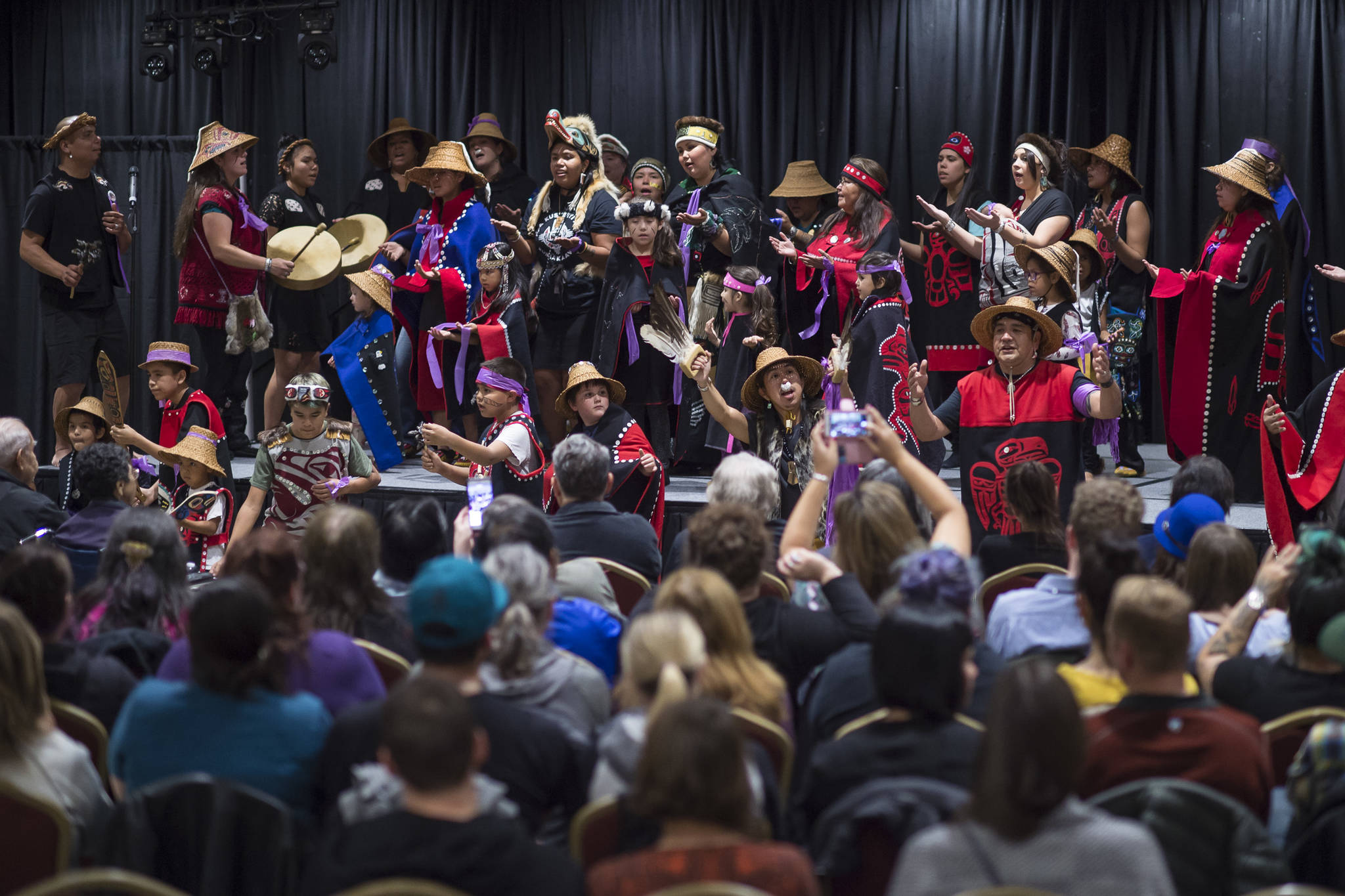“You Don’t Have to Go Home, But You Can’t Stay Here” pushed personal boundaries and blurred artistic ones.
Comedy, dance, drag and poetry mingled on the Elizabeth Peratrovich Hall stage Monday.
The disparate artforms were bound by a common factor: All performers were of indigenous descent.
“I think it’s really exciting that it’s an all-Native cast,” said Ricky Tagaban, a Juneau drag queen and Chilkat weaver.
The night of entertainment was sponsored by Central Council of Tlingit and Haida Indian Tribes of Alaska, and included local and Seattle-based artists.
“Some of this may push personal boundaries, even our traditional boundaries, but it’s important to have a sense of place where we can express ourselves,” said Tlingit and Haida President Richard Peterson on stage after Howie Echo-Hawk’s incendiary stand-up set. “If it made you feel uncomfortable, think about it.”
Performances and artists in “You Don’t Have to Go Home…” were tough to categorize, in part because the performers don’t limit their work to any one medium and frequently struck different tones and incorporated multiple art forms in one act.
Tagaban’s first performance included a faithful lip sync of “Colors of the Wind” from Disney’s “Pocahontas.” A record scratch marked a segue into a more uptempo track that provided the backing for both a catwalk strut into the audience and the reveal of a U.S. flag bearing the message, “Standing Rock.”
Fabian Romero read poetry but also presented “Three Routes,” a short film, which Romero called a digital poem.
“It’s going to be the first time I see people actually watch my film,” Romero said before the show. “It’s going to be very, very exciting to me.”
Halihenna Stepetin, a Unangax dancer from Akutan and now of Seattle, said she doesn’t like the binary implied by labeling dance as traditional or contemporary, but for simplicity she used the words to describe her performances.
“Tonight, I’m doing a mix of traditional and contemporary, so I’m being all of me,” Stepetin said.
That included “Slagux Chiganax Alakax,” which means the wind is not the water.
The performance was inspired by World War II internment, and included slides containing related photos and information.
The slides showed as music blared and red lights swept the room. Stepetin, who removed traditional regalia backstage, continued to dance while smearing paint on her face and body.
Echo-Hawk, whose art is at least stand-up comedy adjacent, prefers not to call what he does comedy.
“I hesitate to call it that,” Echo-Hawk said. “I call it punishment comedy. Sometimes my stuff is not funny.”
Echo-Hawk credited his background growing up near interior Alaska with forging his outlook and the sometimes bleak tone of his work.
“All I know is my experience as a Native guy,” Echo-Hawk said. “I owe my humor to the people I grew up around.”
Pointed jabs at Caucasians, dark observations and references to genocide peppered his set.
The dark humor landed, and Echo-Hawk made it clear that if white audience members did feel alienated, that was OK with him. His intended audience was the Alaska Natives gathered in the room.
Woosh.ji.een Dance Group, who performed to start the event, struck a more unifying tone and added to the night’s varied approach.
“We’re not made up of just one clan, just one tribe,” said group leader Lyle James.
James then pulled the entirety of the audience together by turning the opening “Loon Song” into an interactive experience.
He had all men in the audience form a circle around the women and children and offer to give them their strength.
Then, James spoke emotionally about the importance of protecting all members of a community. He referenced the recent killing of a 10-year-old in Kotzebue, and said no parents should have a child taken away.
He tasked the crowd with being supportive and vigilant in their community.
“Being in a state that has the highest rate of rape, of abuse, we should be standing up for each other,” James said.

